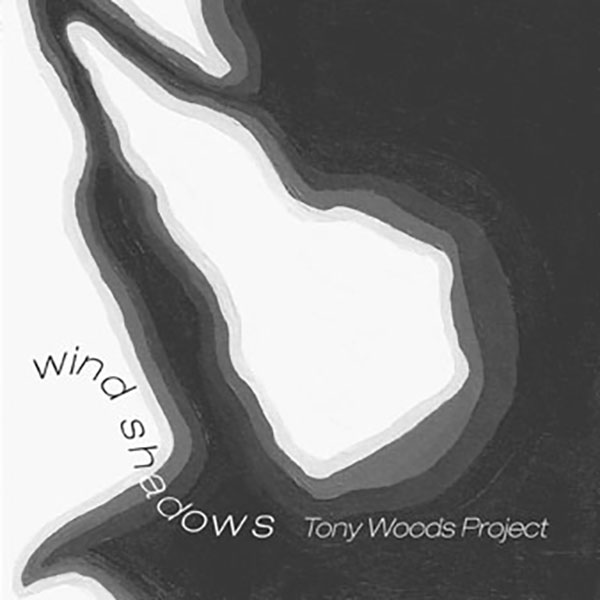
by Ian Mann
June 24, 2009
/ ALBUM
A quiet masterpiece of colourful, eloquent music making with a distinct pictorial quality
Saxophonist Tony Woods describes this album as “Music of light and dark, sweet and bitter, the wind and shadow”. It’s a fairly accurate summation, there is a definite pictorial quality to the music sketched here by Woods on reeds plus an all star cast of Mike Outram (guitar), Rob Millett (vibes, marimba, gongs), Andy Hamill (double bass, harmonica) and Milo Fell (drums). This is the third release by the Project following “High Seas” (FMR 1997) and “Lowlands” (Basho 2004) .
“Wind Shadows” is a beguiling mix of folk inspired melody and jazz improvisation played mainly in a pastoral vein which often gives it a very English quality. There are however ethnic elements plus more overtly “jazzy” moments to ensure that this is genuinely multi cultural music of a highly descriptive nature.
The opening “Driftwood” is a perfect example of this album’s pictorial qualities. This description of a piece of driftwood being washed from the shore to the sea is perfectly depicted by Woods’ various reeds, Outram’s shadowy guitar and Millett’s shimmering vibes. Leisurely and gently atmospheric it’s the kind of thing that wouldn’t be out of place on an ECM record with Woods cast, perhaps as Louis Sclavis and Outram as John Abercrombie.
“Air” opens with some impressive circular breathing from Woods on soprano manipulating the proverbial “column of air”. The main melody of the piece is appropriately breezy and airy with former orchestral percussionist Millett also prominent in the mix. The vibist produces a typically dancing solo but in a track inspired by Eric Dolphy there is also an excursion into free jazz territory about three quarters of the way through the piece before things are resolved by the return of the main theme. It’s clever, invigorating stuff.
“The North Wind Doth Blow” is based on the melody of the children’s song but it is given an unusual twist by Woods deploying the haunting sound of the Chinese hulusi on the intro. Millett adds to the exotic atmosphere through the use of gongs and marimba . Taken as a whole this a haunting, beautiful piece of folk/world jazz, the kind of thing Jan Garbarek might be proud of.
The mood is carried over to the intro of the following “Bitter Sweet” which features Woods on wood flute before a more a more orthodox jazz style emerges. Here Woods demonstrates his abilities on the alto dovetailing with Outram’s guitar on the album’s most full on playing thus far. Contrast is provided by a quieter interlude featuring the return of the wood flute and Hamill’s distinctive contribution on harmonica.
“Dilemma” is a pensive ballad that derives it’s title from “the questioning, uncertain character” of the tune. (Woods’ words from the liner note). It’s a pretty tune featuring keening soprano,lyrical vibes and delicate brushwork.
“Transformation” features the gorgeous tones of Woods’ alto clarinet on an attractive melody that has it’s genesis in an improvised motif. Outram’s soaring guitar and Millett’s percussive colourations are also central to the track’s success. An ethnic feel emerges periodically contrasting nicely with a more abstract and exploratory central section. Like most of Woods’ writing there is the sense of a journey being taken and one with some fascinating scenery along the way.
The title “Wind Shadows” is apparently a sailing term, a reference to the “wind shadows” of other vessels. Woods’ lyrically lilting piece of the same name features the leader on soprano and incorporates a beautifully eloquent solo from bassist Hamill plus suitably stratospheric guitar from Outram as the pierce builds in intensity.
At thirteen plus minutes “French Sweet” is the lengthiest piece on the album, a slowly opening flower that contains some fine playing from all five participants. Impressionistic moments combine with tight unison passages including a swirling mid section that acts as a feature for Fell, his playing a dazzling combination of controlled power with a colourist’s eye for detail.
The closing “Acceptance” with Woods on reflective sounding tenor exhibits some of the Zen like calm suggested by the title.
Wind Shadows” is not an album that shouts for your attention but rather gains it through subtle, colourful, eloquent music making. It’s a record that slowly draws you in, each new listen reveals a different nuance or facet in these intelligent, carefully crafted compositions. It’s an excellent team effort with all five musicians making telling contributions. Millett should perhaps be singled out as his percussive contribution does much to establish a unique sound. Not only that he also engineered and mixed the album, co-producing it with Woods.
As for the leader he displays a considerable mastery of several different types of reed as well as demonstrating considerable skill as a writer and arranger. The questing intelligence and sheer variety of his playing sometimes reminded me of Harrison Smith and the cinematic quality of his writing of a more laid back Theo Travis. But “Wind Shadows” is something of a quiet masterpiece in it’s own right.
Woods will be touring to promote the album. For details visit http://www.tonywoods.org
blog comments powered by Disqus